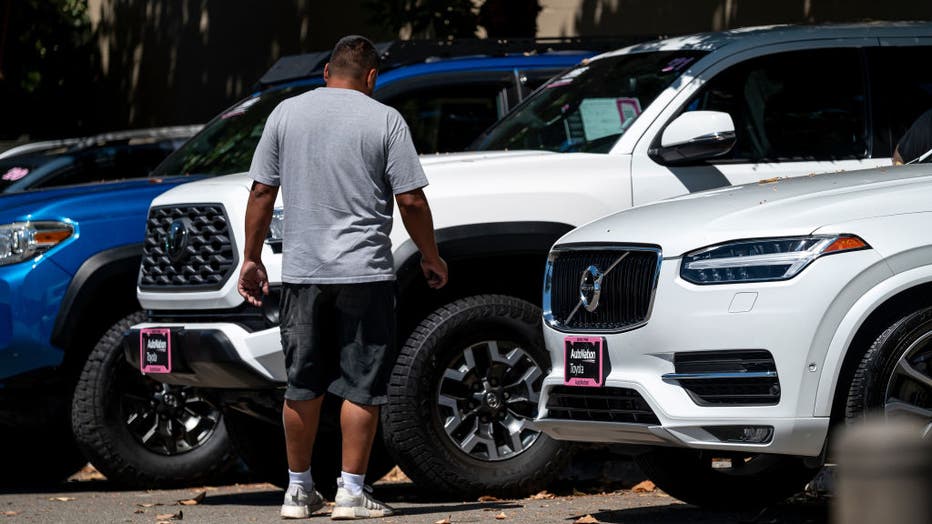Are consumers skipping car dealers and buying private?
Gas Buddy: 2024 gas prices outlook
Gas prices fell in 2023, but what might they look like in 2024? Experts with Gas Buddy join LiveNOW from FOX to share the latest predictions and reasons why.
LOS ANGELES - The automotive industry is experiencing a volatile period marked by high prices, low supply, and changing consumer behaviors. This turbulence stems from a combination of factors, including the COVID-19 pandemic, which disrupted supply chains, and inflation, which has driven up the cost of both new and used vehicles.
As a result, many consumers are reevaluating their options and considering whether buying privately or through a dealership is more advantageous.
Here’s what an industry expert thinks.
Why are car prices inflated right now?
According to Tom Maoli, owner of Celebrity Motor Car in New Jersey, "Prices are astronomically inflated in the car market. Used cars are high, new cars are high, interest rates are high. So it's very difficult for the consumer."
Maoli explains that the current inflation levels have significantly influenced where and how consumers choose to buy their cars.
He noted that the lack of supply, driven by ongoing supply chain disruptions still felt from the COVID-19 pandemic, is a primary driver of this inflation.
"When COVID hit, a lot of factories were shut down, and many places were put out of business. The supply chain still hasn't fully recovered, and that’s driving prices up," Maoli said.
Are people buying more cars privately or from dealerships?
Maoli explained that while buying privately can be cheaper than working with a dealership, he believes consumers face a flurry of legal and practical challenges when buying from a private seller, which he feels is driving them to dealer lots.
"[Buying privately] is a lot more work. You have to get out there and you have to search and drive around to people's homes, see these cars, kick the tires, and, you know, kind of make sure that you have that car checked out because, at the end of the day, you don't want to buy a lemon," Maoli said.

A customer looks at vehicles for sale at an AutoNation Toyota dealership in Hayward, California, US, on Monday, June 24, 2024. (Photographer: David Paul Morris/Bloomberg via Getty Images)
Pros and cons of buying privately vs. dealerships, according to an expert:
Pros of buying privately:
- Potential cost savings: Private sales can sometimes be cheaper and less intimidating as you avoid dealership fees, overhead costs, and frustrating negotiations.
- Negotiation flexibility: There's often more room to negotiate the price directly with the seller.
- Wider selection: You might find unique or rare vehicles that aren’t available at dealerships.
Cons of buying privately:
- More work: Buying privately requires extensive effort, including searching for cars, visiting multiple locations, and ensuring thorough inspections, which can be time-consuming and demanding.
- No warranty: Private sales typically do not come with warranties, increasing the risk of buying a vehicle with hidden issues.
- Trust and safety issues: When meeting strangers for test drives and transactions, there is a risk of encountering dishonest sellers or unsafe situations. Although that can certainly be a factor at dealerships.
Pros of buying from a dealership:
- Trust and reliability: "I always like going to the dealership because of the trust factor and also making sure that cars are serviced properly," Maoli says.
- Certified pre-owned options: Dealerships offer certified pre-owned vehicles that have been thoroughly inspected and come with warranties.
- Financing options: Dealerships provide various financing options which may not be available in private sales.
- Convenience: One-stop shop where you can buy a new vehicle and trade in your old one.
Cons of buying from a dealership:
- Higher costs: There are fees associated with buying from a dealership because they have overhead to cover.
- Potential pressure: Dealerships may exert sales pressure, making the buying experience less pleasant for some.
- Limited negotiation: There's often less flexibility in negotiating prices compared to private sales.
When is the best time to buy a car?
Maoli advises that the end of the month is generally the best time to buy a car.
"Dealers are looking to close out their month and make deals," he said, adding that this timing can offer more negotiating power and potentially better deals.
RELATED: Is now the best time to buy a used car? Experts weigh in on post-pandemic pricing trends
Top things consumers need to look out for:
- Check the car's brakes: Ensure the brakes are in good condition to avoid future safety issues and costly repairs.
- Inspect the tires: Look for tire wear and confirm that the tires are not recapped, which could indicate poor quality.
- Review the service history: Verify that the car has been properly maintained with regular oil changes and filter replacements.
- Use Carfax: Check for any accident history or significant repairs that might not have been properly fixed.
- Have a mechanic inspect the car: Get a trusted mechanic to thoroughly inspect the vehicle before finalizing the purchase to avoid hidden issues.
- Verify warranties: If buying from a dealership, ensure the car comes with a warranty or is certified pre-owned to provide peace of mind.
- Be cautious with private sellers: Ensure all paperwork is in order and be aware of the risks involved in meeting and negotiating with strangers.
- Consider financing options: Dealerships often provide financing options that might not be available when buying privately.
- Negotiate effectively: Whether buying privately or from a dealership, be prepared to negotiate the price to get the best deal possible.
- Safety and reliability: Prioritize vehicles that are known for their safety and reliability records to ensure long-term satisfaction.

